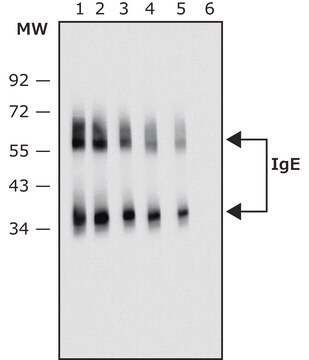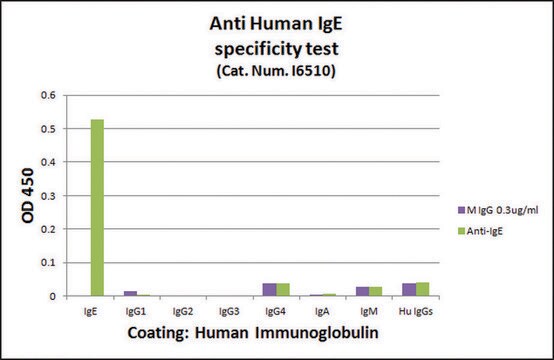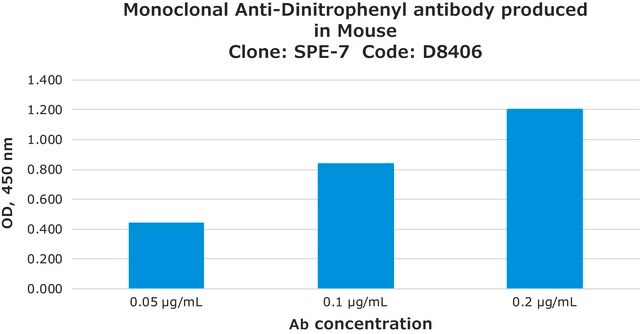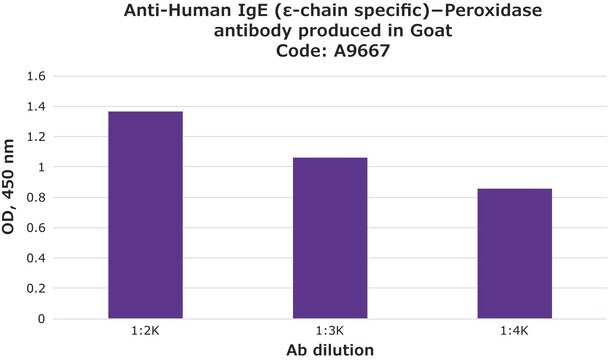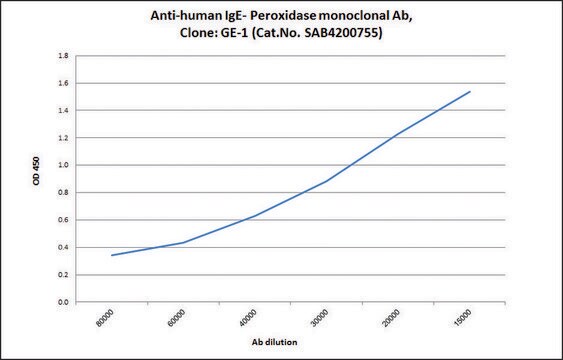SAB4700352
Monoclonal Anti-IgE antibody produced in mouse
clone 4H10, purified immunoglobulin, buffered aqueous solution
Sinonimo/i:
Anti-IGHE
Autenticatiper visualizzare i prezzi riservati alla tua organizzazione & contrattuali
About This Item
Codice UNSPSC:
12352203
NACRES:
NA.41
Prodotti consigliati
Origine biologica
mouse
Livello qualitativo
Coniugato
unconjugated
Forma dell’anticorpo
purified immunoglobulin
Tipo di anticorpo
primary antibodies
Clone
4H10, monoclonal
Stato
buffered aqueous solution
Reattività contro le specie
human
Concentrazione
1 mg/mL
tecniche
flow cytometry: suitable
Isotipo
IgG1
N° accesso NCBI
N° accesso UniProt
Condizioni di spedizione
wet ice
Temperatura di conservazione
2-8°C
modifica post-traduzionali bersaglio
unmodified
Informazioni sul gene
human ... IGHE(3497)
Categorie correlate
Descrizione generale
Immunoglobulin E (IgE) is encoded by the gene mapped to human chromosome 14q32.33. IgE belongs to the immunoglobulin family and consists of epsilon(ε) heavy chain in the constant (C) region. IgE has a monomeric structure with an extra domain in the constant region.
The antibody 4H10 reacts with human IgE; it recognizes an epitope different from the ones recognized by BE5 and 4G7 antibodies to IgE.
Immunogeno
Purified human IgE
Applicazioni
The reagent is designed for Flow Cytometry analysis. Suggested working dilution for Flow Cytometry is 4 μg/mL of sample. Indicated dilution is recommended starting point for use of this product. Working concentrations should be determined by the investigator.
Azioni biochim/fisiol
Immunoglobulin E (IgE) binds very tightly to Fc receptors on basophils and mast cells.Thus, it plays a major role in stimulating allergic reactions. Elevated expression of the gene has been associated with the development of hyper IgE Syndrome (HIES), hay fever, atopic skin diseases such as eczema, anaphylactic shock and IgE-myeloma. In addition, overexpression of IgE is also observed in allergy/asthma.Therefore, increased levels of serum IgE can be considered as a diagnosis for asthma. IgE expression is down-regulated in congenital agammaglobulinemia and hypogammaglobulinemia because of faulty metabolism or synthesis of immunoglobulins.
Caratteristiche e vantaggi
Evaluate our antibodies with complete peace of mind. If the antibody does not perform in your application, we will issue a full credit or replacement antibody. Learn more.
Stato fisico
Solution in Tris buffered saline, pH 8.0, with 15 mM sodium azide.
Esclusione di responsabilità
Unless otherwise stated in our catalog or other company documentation accompanying the product(s), our products are intended for research use only and are not to be used for any other purpose, which includes but is not limited to, unauthorized commercial uses, in vitro diagnostic uses, ex vivo or in vivo therapeutic uses or any type of consumption or application to humans or animals.
Non trovi il prodotto giusto?
Prova il nostro Motore di ricerca dei prodotti.
Codice della classe di stoccaggio
10 - Combustible liquids
Classe di pericolosità dell'acqua (WGK)
WGK 1
Punto d’infiammabilità (°F)
Not applicable
Punto d’infiammabilità (°C)
Not applicable
Scegli una delle versioni più recenti:
Possiedi già questo prodotto?
I documenti relativi ai prodotti acquistati recentemente sono disponibili nell’Archivio dei documenti.
T Gülen et al.
Clinical and experimental allergy : journal of the British Society for Allergy and Clinical Immunology, 44(9), 1179-1187 (2014-07-22)
The mechanisms by which mast cells in patients with unexplained anaphylaxis (UEA) are triggered remain elusive. Onset of episodes is unpredictable and often recurrent. The substantial overlap between the clinical manifestations of UEA and clonal mast cell disorders (CMD) suggests
Hans D. Ochs, C. I. Edward Smith, Jennifer M.
Primary Immunodeficiency Diseases: A Molecular and Cellular Approach (2006)
Binie Ver Lipps
Immunoglobulin E (Ige): Novel Treatment for Lowering the Concentration of Ige (2009)
N. Franklin Adkinson, Jr., Bruce S. Bochner, Wesley Burks, William W. Busse, Stephen T. Holgate
Middleton's Allergy: Principles and Practice
(2013)
Adriana Turqueti-Neves et al.
European journal of immunology, 44(7), 2130-2138 (2014-04-30)
Infection with helminths and exposure to antigens induce a strong type 2 immune response resulting in the secretion of the cytokines IL-4 and IL-13 by CD4(+) T cells and several innate cell types. IL-4 and IL-13 promote class switch recombination
Global Trade Item Number
| SKU | GTIN |
|---|---|
| SAB4700352-100UG | 4061832707174 |
Il team dei nostri ricercatori vanta grande esperienza in tutte le aree della ricerca quali Life Science, scienza dei materiali, sintesi chimica, cromatografia, discipline analitiche, ecc..
Contatta l'Assistenza Tecnica.